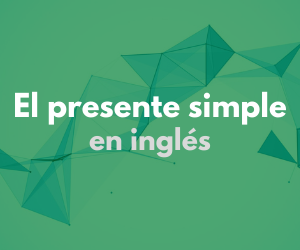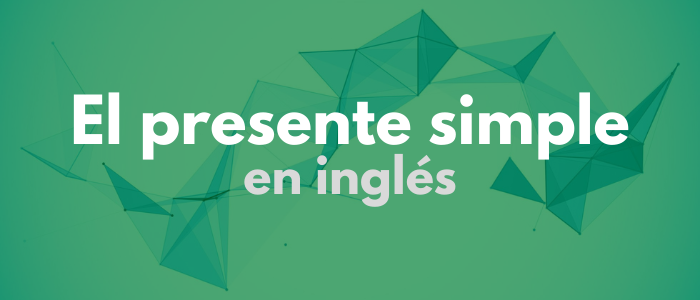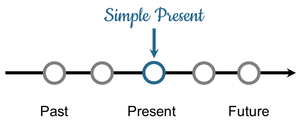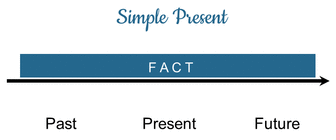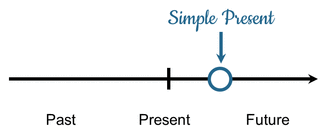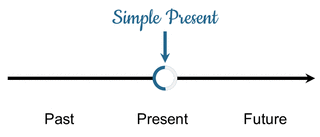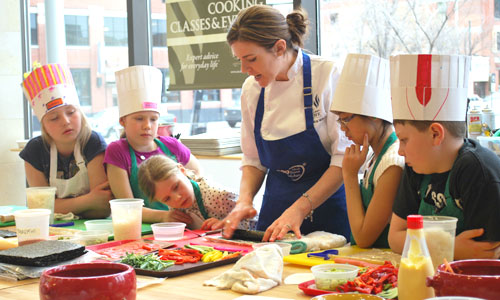| To express opinions, states, feelings, possession or things that happen inside our heads Expresar opiniones, estados, sentimientos, posesiones o cosas que suceden dentro de nuestra cabeza
|
| |||
- I work in a bank - Yo trabajo en un banco.
- You get up early every day - Tu te levantas temprano todos los días.
- She works in an office - Ella trabaja en una oficina.
- She studies at university - Ella estudia en la universidad.
- He goes to the movies every Wednesday - Él va al cine todos los miércoles.
- It rains every afternoon in summer - Llueve todas las tardes en verano.
- We play baseball on Friday nights - Nosotros jugamos béisbol los viernes en la noche.
- You travel together as a happy couple - Ustedes viajan juntos como una pareja feliz.
- They pay with cash - Ellos pagan en efectivo.
| |||
- I do not speak Portuguese - Yo no hablo Portugués.
- She does not speak Portuguese - Ella no habla Portugués.
- You don’t like apples - No te gustan las manzanas.
- He doesn’t like apples - No le gustan las manzanas.
| |||
- Do you work in a bank? -Yes, I do/No, I don’t - ¿Trabajas en un banco? -Si, si lo hago/No, no lo hago.
- Does she work in a bank? -Yes, she does/No, she doesn’t - ¿Trabaja ella en un banco? -Si, si lo hace/No, no lo hace.
Afirmativa |
Negativa |
Interrogativa |
I read books. |
I don't read books. |
Do I read books? |
You read books. |
You don't read books. |
Do you read books? |
He reads books. |
He doesn't read books. |
Does he read books? |
She reads books. |
She doesn't read books. |
Does she read books? |
It reads books. |
It doesn't read books. |
Does it read books? |
We read books. |
We don't read books. |
Do we read books? |
They read books. |
They don't read books. |
Do they read books? |
| |||
- What do you do? - ¿A que te dedicas?
- Where does he work? - ¿Dónde trabaja él?
- When does she do her homework? - ¿Cuándo ella hace su tarea?
- How long do tigers live? - ¿Cuánto tiempo viven los tigres?
- Who do you think you are? - ¿Quién crees que eres?
- How do we hear? - ¿Cómo escuchamos?
- cook = cooks (She cooks spaghettie - Ella cocina espaguetis).
- cost = costs (It costs 56 dollars - Cuesta 56 dólares).
- eat=eats (He eats a healthy diet and exercises regularly - Él lleva una dieta saludable y hace ejercicio con regularidad).
- get=gets (He gets up late - El se levanta tarde).
- like = likes (He likes apples - Le gustan las manzanas).
- live = lives (Frank lives in a big city - Frank vive en una gran ciudad).
- orbit=orbits (The moon orbits the Earth - La luna órbita la tierra).
- read=reads (My grandfather reads the newspaper in the mornings - Mi abuelo lee el periódico por las mañanas).
- taste=tastes (This soup tastes great! - ¡Esta sopa sabe muy bien!).
- want=wants (She wants that red dress now - Ella quiere ese vestido rojo).
- work=works (Michael works in a hospital - Miguel trabaja en un hospital).
- have = has (He has a new car - Él tiene un auto nuevo).
- go = goes (She goes to the park every day - Ella va al parque todos los días).
- do = does (He does his homework after school - Él hace su tarea después de la escuela).
Los verbos terminados en: vocal + "y" se le agrega "-s"
- pay - pays (She pays with cash - Ella paga en efectivo).
- play – plays (The dog plays with the ball - El perro juega con la pelota).
- say – says (The parrot says "Hello" - El loro dice "Hola").
Los verbos que terminan en: "-y" cambian "-y" por "-ies"
- cry = cries (The baby cries if she's hungry - La bebe llora si tiene hambre).
- deny - denies (The president denies the affair - El presidente niega la aventura).
- marry = marries (A happier man loves the girl he marries - Un hombre más feliz ama a la chica con la que se casa).
- study = studies (She studies and works - Ella estudia y trabaja).
Los verbos que terminan en: "s", "z", "sh", "tch" y "ch" se le agrega "-es"
- buzz = buzzes (The bee buzzes like a lawnmower - La abeja zumba como una cortadora de césped).
- miss = misses (He misses you so much - Él te extraña mucho).
- wash = washes (He washes his car every weekend - Él lava su auto todos los fines de semana).
- watch = watches (She watches television in the living room - Ella ve la televisión en la sala).
- teach = teaches (The trainer teaches in a gym - El entrenador enseña en un gimnasio)
2. Her brother _____________ (not speak) French.
3. My grandparents _____________ (not drink) coffee.
4. Karla _____________ (go) to cooking class on Friday.
5. _____________ (do/know) what his daughter did?
6. Mrs. Sally Jones _____________ (teach) science at Kentucky High School.
7. The babies _____________ (cry) when they are hungry.
8. Alfred _____________ (have) three dogs.
9. _____________ (do/feel) sick?
10. People _____________ (need) food to live and grow.
Respuestas:
1. like
2. doesn't speak
3. don't drink
4. goes
5. Does he know
6. teaches
7. cries
8. has
9. Do you feel
10. need
